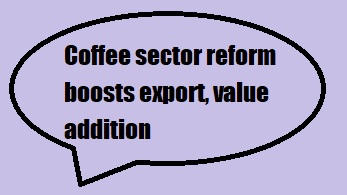
• Export earning jumps to 407 mln USD
The coffee sector reform has helped to boost international demand for Ethiopia’s specialty coffee, value addition and export performance, Ethiopian Coffee Exporters Association General Manager Gizat Worku says.
The previous proclamation regulating coffee marketing and quality control did not include any guideline about value addition in coffee while the new legislation has included an article that specifically promotes the practice of coffee value addition.
As to the Association, the vertical integration procedure in the legislation which was put in place three years ago is bearing fruit and scaling up the export of Ethiopia’s specialty coffee.
Moreover, a lot of activities have been carried out to improve the awareness of farmers regarding the content and goal of the new proclamation. This has also spurred farmers to increase their gains by applying the legislation, Gizat tells The Ethiopian Herald.
According to him, the new legislation has also opened doors for out-growers’ schemes to flourish. In short, a given supplier can reach an agreement with buyers to sell the coffee without the interference of the Ethiopian Commodity Exchange (ECX).
This procedure makes the export of specialty coffee easier and helps build a strong relationship between suppliers and buyers, he added.
Specialty means a coffee which is not sold as per New York C- market price, Gizat says adding that specialty coffee is a term relating to the entire supply chain and to the ordering and purchasing of a type of coffee in demand as per its traceability, quality and specialty standard.
“In short, working on specialty coffee means, making it traceable.”
Previously, few coffee production areas were best-known in the international market. But now, the names of coffee-producing woredas and kebeles are also represented in the coffee market. The buyers get full information about the coffee presented for sale from each area.
Indicating that there are limitations in handling data, he adds, but Ethiopia has witnessed an increase in income from the export of specialty coffee.
By reaching an agreement with the farmers in their respective areas, the out-growers’ scheme would help train the farmers on how to produce and supply the coffee for exporters. This has created a simple value chain.
Exporters also buy the coffee after checking its quality. “Thus, they can confidently tell about the quality of the coffee when they sell it to other countries. These are the basics that improve the marketing of specialty coffee.”
The vertical integration may have its own drawbacks, thus, the Tea and Coffee Authority should conduct a study to fill gaps, particularly in relation to financial exchange, Gizat advises.
Until the end of last January, Ethiopia has exported its specialty coffee to 61 countries.
According to the Ethiopian Coffee and Tea Authority, by increasing the supply of specialty coffee and value-added coffee export, the country has secured 407.53 million USD during the past seven months.
Authority Director-General Adugna Debela says the export performance has witnessed a big boost as the country has managed to export about 150,000 tons of coffee only in the last seven months.
Despite a high-volume in export, the revenue is less than the record gained 10 years ago because of lower prices.
Adugna said that the country is working to double its revenue from coffee export and eyeing new destinations through its specialty coffee production.
Indicating that new demands from U.S, China, and South Korea are picking Ethiopian specialty coffee, he says the country is working to access these new market destinations.
Beyond the regular destinations such as Europe, the US and some Middle East countries, Ethiopia is now focusing on the Chinese market for the export of its specialty coffee, he adds.
Ethiopian Herald February 27/2020
BY GIRMACHEW GASHAW





